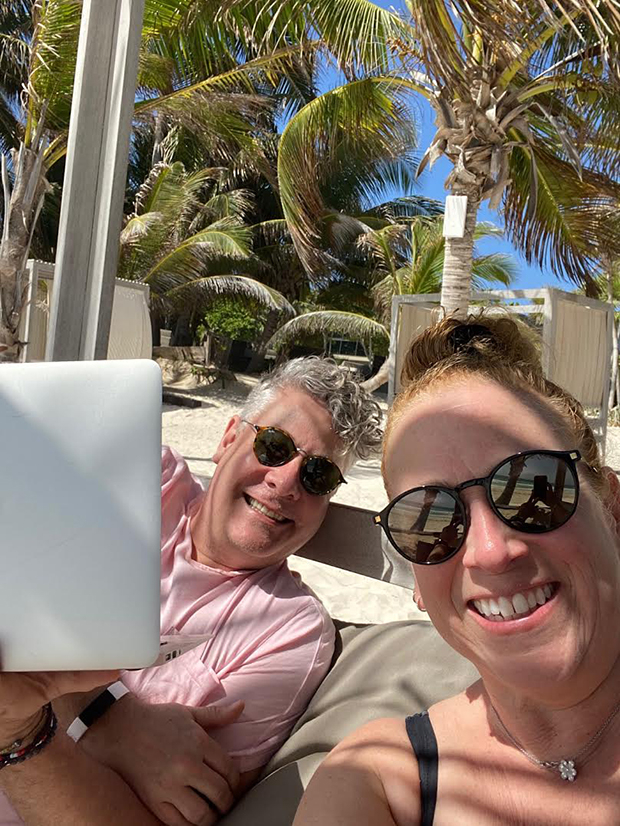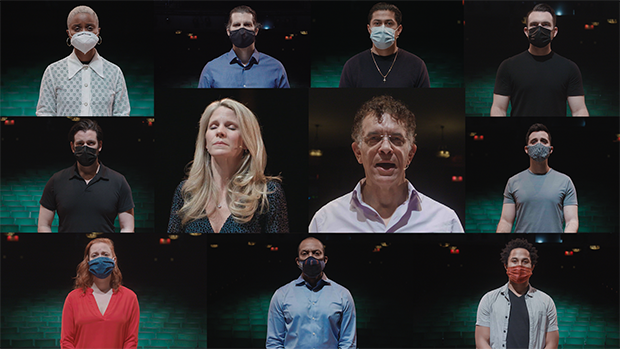Interview: Jodi Picoult and Tim McDonald on the Experiences That Led to Their New Musical
”Breathe” begins streaming on May 14 via Overture.
Novelist Jodi Picoult was getting ready to make her theatrical debut in March 2020.
Picoult wasn't one of the writers of the off-Broadway musical Between the Lines (that task fell to librettist Tim McDonald and songwriters Elyssa Samsel and Kate Anderson), but as co-author of the source material, she was deeply involved with the process. Cut to March 13, and the world stopped.
As writers, Picoult and McDonald felt like they had to explore the Covid-19 pandemic in some way, but Picoult couldn't really figure out how to make it a book. Instead, they created Breathe, a new series of five short, interconnected musicals about the way the crisis affects different couples. Filmed at 92Y with no audience, and a featuring cast that includes Kelli O'Hara, Brian Stokes Mitchell, Patti Murin, Colin Donnell, and more, Breathe runs for eight weeks beginning May 14 on Overture .
Creating Breathe was a very personal experience, for a lot of different reasons. Here, Picoult and McDonald tell us about its creation.

(image provided by the production)
I want to go back to last year, since I know you were both working on Between the Lines. How did that partnership morph into Breathe?
Jodi Picoult: Between the Lines is where Tim and I met. Tim is the librettist and he very kindly made it clear that he would welcome my involvement as the underlying rights holder. I know how to write [books] but I don't know how to write a libretto, and I really learned that from Tim. When Covid happened, we were getting ready for Between the Lines. The last thing that we really did in the real world was go to the wedding of our cast member, Arielle Jacobs, in Mexico, which is right before we were going to start. We were there, Jeff Calhoun was there, all hanging out together at this wedding. And the following week, everyone at our table had Covid but me.
After Tim recovered, we kept saying that we somehow had to chronicle what was happening because that's the job of a writer. I couldn't figure out how to do it at the time in a novel, but theater felt right. So we came up with the idea of writing a bunch of short stories showing the effect of the pandemic on different couples. We realized that we had to incorporate the George Floyd murder into the story because we felt it was directly connected to what was happening in the pandemic, and we also realized that there was no way we should be writing that story, so we invited Douglas Lyons to come on board as librettist and songwriter. That's when we started thinking about how many people we can employ, and that's why we ended up with multiple songwriting teams and directors.
Tim, having lived through Covid and survived, thankfully, what is it like for you to then put your pen to paper and sort of relive that trauma, but then inflict it on fake people?
Tim McDonald: On the one hand, it was sort of my revenge against Covid. Like, I'm going to spread the word about how terrible you really are. But in writing the liner notes for the album, I realized that it all comes back to being a 13-year-old kid who knew he was gay just as AIDS hit. So that shame, that stigma, lives with me, only then we didn't get a vaccination in eight months; it was more like 22 years before there was a treatment. So there's a lot of conflict in that with me regarding this. But because we wrote it in real time, it starts light, like a rom-com, and then it gets progressively darker and darker, and then very dark.
Fast forward, we finished writing the five initial stories in June 2020, and then by the last week of July, my father-in-law passed away from Covid alone in an assisted living facility, exactly in the manner in which we had written in the show. So the irony and the reality of that has been really difficult. My husband and I just watched it on Friday night and we can't get through it.

(image provided by the production)
Tell me about the Zoom workshop and development system you came up with for this, which included five different teams, essentially.
Jodi: One of the things that we did at first was to have college musical theater programs perform the material that we gave them and they filmed it for us to look at. It was very helpful, in that we understood exactly what we had to change. We also realized we gotta be in the room.
At the end of 2020, we tried to come up with a way that we could safely do a workshop. What we did was split everything into five pods that were basically running simultaneously. Every pod had its own director, music director, a stage manager, two actors who hopefully were quarantined together, but couldn't always be, and everyone on the creative team was zooming in. You can imagine how challenging that was given that Tim and I had to be in the same place at one time, which was not easy.
Tim: It was really challenging. I call it the Olympics of Collaboration because each of the songwriting teams had different ways in which they wanted to collaborate. Some of the songwriting teams used our book and placed songs exactly where we thought they should go; others wanted to work with us on the book and develop it together. In the case of Douglas Lyons's piece, we had the outline of a story, but then he took it and ran with it and wrote the book for that. So it was really different but really fun. It was hard when we were doing the workshops because three of the shows went on the same day and Jodi and I were basically firefighters who would drop into a rehearsal room on Zoom if there was a problem with a section of dialogue.
Breathe is streaming and feels almost created for that, obviously by virtue of the situation. I know it's licensable, but where do you see it going from here?
Jodi: When I look at the film, what I feel like we did was incorporate the pandemic into it to acknowledge the fact that we don't have an audience. What we're giving you is the most simple form of musical theater we can, which is the story, and saying we're going to let you imagine the sets and costumes and props. I feel like we could stage this in a week. Literally, give me four pieces of wood and a can of paint and we'll just build a set that we can adapt. But I would really love to see it done, and I expect to see it done. I feel like there's going to be a world where we need to remember this time. We wanted to have learned something from when the world shut down, and I would love to see this being performed on anniversaries, and commemorating what it was like in March 2020, when everything stopped for a minute.









